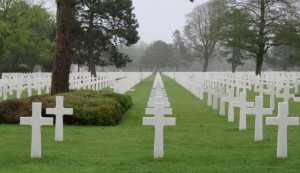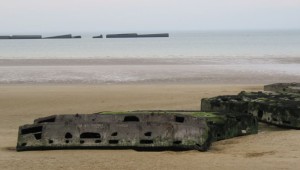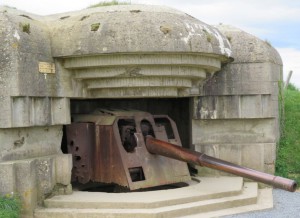D-Day
 Recently, Sue Homant, Head of Reference Services at the library, discussed her trip to Normandy, France with Cameron Pierson, library intern. Her experiences (and pictures) had them thinking about D-Day and the part librarians played in World War II. So, they dug a little deeper.
Recently, Sue Homant, Head of Reference Services at the library, discussed her trip to Normandy, France with Cameron Pierson, library intern. Her experiences (and pictures) had them thinking about D-Day and the part librarians played in World War II. So, they dug a little deeper.
American Cemetery, Normandy, France
72 years ago, on 6 June 1944, the Allied Forces landed on Normandy in an event that would become known as D-Day. This was a major turning point in the war, contributing to the eventual defeat of the Axis Powers. Now, in 2016, most of us know of these events, either from our grandparents, school, or the History Channel. Yet, what is lesser known are the efforts undertaken by the American Library Association to insure that our men in uniform, no matter where they were in the world, would still have access to reading material.
The Victory Book Campaign (V.B.C.) was a program that worked to maintain and enhance library services to those in the Army, Navy, and the Marines. Such services were spurred by the previous World War and laid the groundwork for continued library support, even to this day. Initiated by the leaders of the American Library Association, the campaign itself is said to have had mixed results as it worked within a war-time backdrop. Nonetheless, the program was able to collect in excess of a million books which were used by soldiers for continued education, technical support, and even leisure – something fundamental to morale.
German bunker, Normandy, France
 The program coordinated with many organizations (both public and private) to obtain donations from the American people. The books collected and later deemed suitable were an effort to support the mental and emotional wellbeing of the soldiers during such a horrific war. This type of undertaking is astounding even by today’s standards. It serves to remind us of the democratic function of libraries. In appreciating this lesser known piece of history, one cannot think about libraries without also thinking about those democratic values so central to free societies.
The program coordinated with many organizations (both public and private) to obtain donations from the American people. The books collected and later deemed suitable were an effort to support the mental and emotional wellbeing of the soldiers during such a horrific war. This type of undertaking is astounding even by today’s standards. It serves to remind us of the democratic function of libraries. In appreciating this lesser known piece of history, one cannot think about libraries without also thinking about those democratic values so central to free societies.
Remnents of Allies Mulberry, a floating harbor on Omaha Beach, Normandy, France
Connor, J. (1942). On to victory with the Victory Book Campaign. ALA Bulletin, 36(9), 552-554. Retrieved from http://www.jstor.org.proxy.lib.wayne.edu/stable/25691447
Passet, J. E. (2007). [Review of the book Books and Libraries in American Society during World War II: Weapons in the War of Ideas, by Patti Clayton Becker]. New York: Routledge. Retrieved from https://muse.jhu.edu/article/214299
Weeks, L. (2015, July 4). When America’s librarians went to war. NPR. Retrieved from
http://www.npr.org/sections/npr-history-dept/2015/07/04/418840245/when-americas-librarians-went-to-war
Written by Cameron Pierson, Wayne State University LIS practicum student. Photos by Sue Homant.

